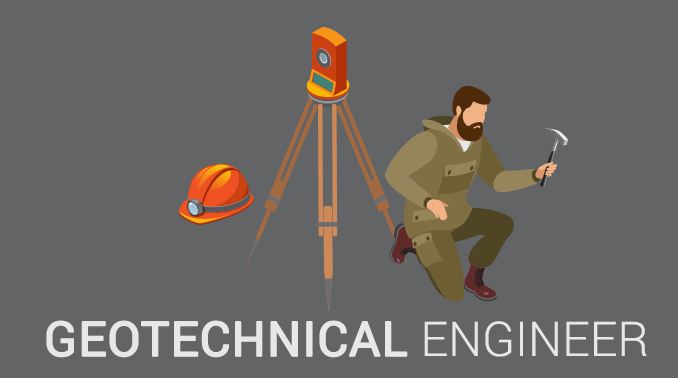The Main Principles Of Geotheta
The Main Principles Of Geotheta
Blog Article
Some Known Incorrect Statements About Geotheta
Table of ContentsThe 30-Second Trick For GeothetaGetting My Geotheta To WorkSome Known Questions About Geotheta.Not known Facts About Geotheta
They collaborate with civil engineers, architectural designers, architects, and various other professionals to incorporate geotechnical factors to consider into the general project style and building process. This requires effective teamwork, sychronisation, and interaction to make certain that the geotechnical facets straighten with the task goals and satisfy regulatory requirements.Mining & Materials Design: Principles of boring, penetration prices, and factors influencing the option of boring method. Features of dynamites, shooting systems and blast patterns. Blowing up methods in surface area and below ground functions. Special blowing up techniques at excavation borders. Vibration and sound control. Mechanical and constant techniques to fragmentation, including longwall shearing and fullface boring.
Modelling of piece and bit dimension distributions; comminution as a transfer function. Comminution technology: squashing, grinding, size classification. Integrated evaluation of fragmentation and comminution operations. Supplied by: Mining & Products Design.
How Geotheta can Save You Time, Stress, and Money.
Bachelor's level programs in civil, geotechnical, geological, and ecological design usually last 4 years and include basic education and learning courses in English, social science, and the humanities, in addition to training courses in innovative mathematics, structural geology, and liquid mineralogy. (https://www.intensedebate.com/people/geotheta)
Geotechnical design involves the evaluation of the dirt and rock problems at a particular site, and their implications for the development of that site. As most structures count on the ground for assistance, it is without surprise that a thorough understanding of the ground conditions, and the viability of structure systems, are essential to the lasting stability and performance of the building or structure.
Being experts in the investigation of geological developments and ground behaviour, geotechnical engineers do scientific examinations and testing to comprehend the effect these geological developments might carry the design and building of structure, civil and framework tasks. This expertise is essential for the design and construction of buildings, roads, passages, dams, bridges, and supply of water and sewer system.
The geotechnical team at Douglas Partners regularly talk to designers, style engineers, developers, and contractors to make suggestions on style and growth proposals to make sure that the developed structures are suitably designed for the ground conditions. As an example, the style of footing systems requires to think about the weight of the structure, the capability of the ground to support that weight along with movement resistances and effective building and construction.
What Does Geotheta Do?
This task is substantially simplified by the usage of our Douglas Map geospatial system which makes this info conveniently easily accessible in an easy to utilize web internet browser user interface. A geotechnical designer will guide the drilling of boreholes and examination pits to gather dirt and various other samples, and likewise evaluate surface attributes and ground exposures to create a geotechnical model of the subsurface problems.
Depending on the project type and ground problems experienced, research laboratory testing may to name a few points assess stamina, compressibility, sensitivity and/or leaks in the structure of dirt and rock samples. After this data is gathered and collated, the results are utilized for a geotechnical version of the site, which is typically offered as sections across the website.

A geotechnical examination naturally can only examine the ground conditions at the areas pierced or dug deep into. Natural variations in soil and rock conditions can occur across a site and between test places. It is for that reason good method that the geotechnical designer be preserved throughout building and construction of the project to give on-site verification that the ground problems encountered are consistent with the expectations and recommendations supplied in the geotechnical examination record.
The Ultimate Guide To Geotheta
Geotechnical designers utilize their in-depth knowledge of dirt and rock to examine danger and resolve problems on varied facilities projectsGeotechnical design is a specialist branch of civil engineering which takes a look at the behaviour of earth products and the application of dirt and rock auto mechanics. Consulting Engineers. As a geotechnical engineer, you will certainly assess the physical, mechanical and chemical residential or commercial properties of dirt and rock in order to design structures, maintaining frameworks and earthworks
Geotechnical engineering is closely linked to and overlaps with, both engineering geology click over here and ground design - https://www.anyflip.com/homepage/zuylo. It's possible to specialise in geotechnics or benefit a geotechnical company yet be called an engineering geologist or a ground designer. As a geotechnical engineer, you'll need to: construct and preserve connections with clients and various other professionals associated with the site, throughout each projectmaintain safety and security requirements on site be conscious of price ramifications when you make recommendationsstudy geological maps and aerial photos from a variety of sources and from various time periodsexamine construction intends to see exactly how viable they are based on your understanding of the siteinvestigate threats or geological risks for the sitesearch for environmentally delicate functions, such as landfill beginning to establish factual and interpretive ground modelsplan field investigationsdrill and evaluate samples of bedrock, soil, groundwater and additional products oversee other professionals on sitesolve technological issues as they develop, such as unexpected frameworks at drill sitesmonitor conditions during and after building and construction to make certain frameworks are steady in the short and long termadding data accumulated on site to your first researchcreating geotechnical computations, drawings, and two or three-dimensional computer system designs analyzing the datamaking suggestions about the recommended use the website

Report this page